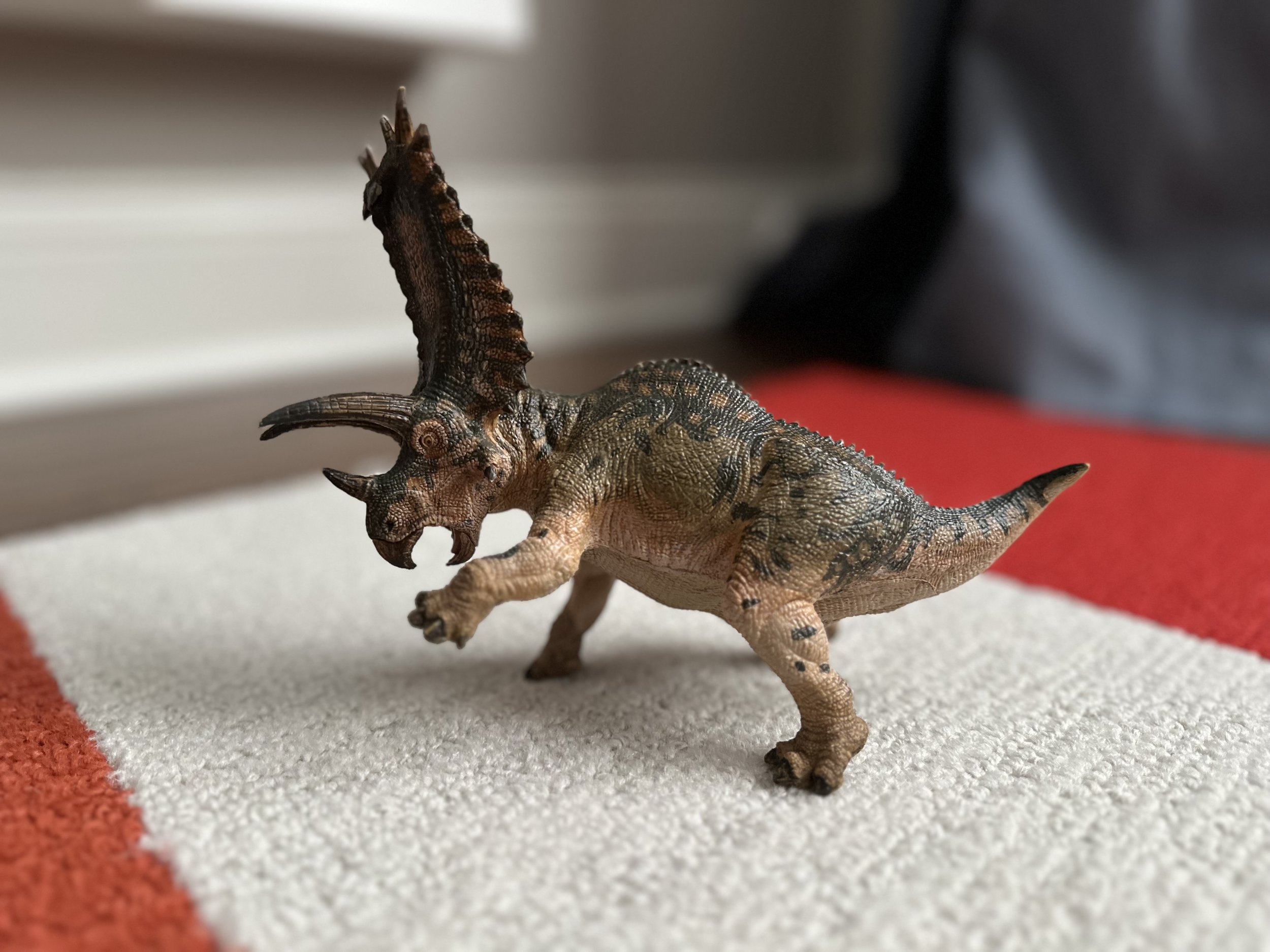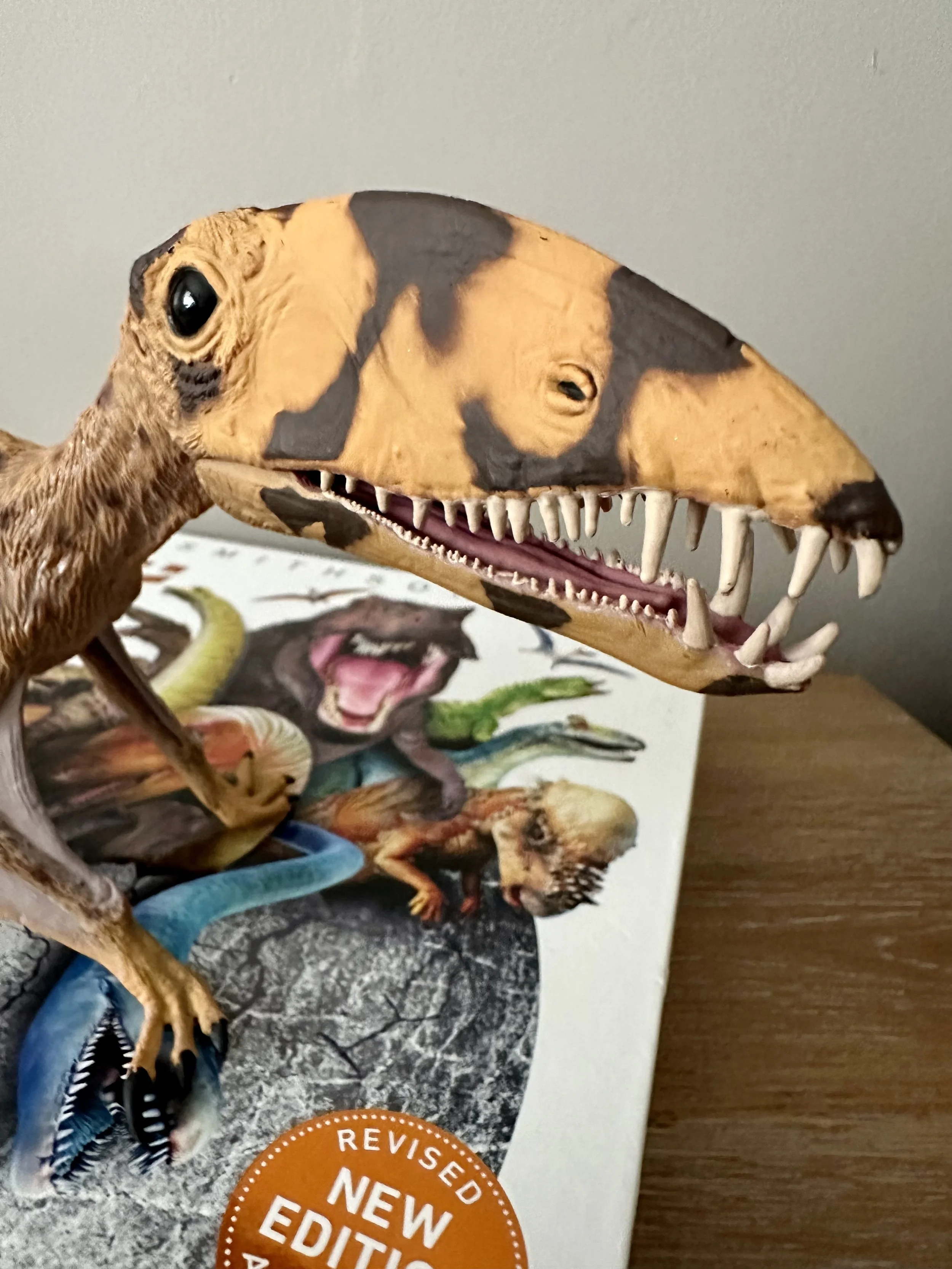What is a Dinosaur?
What makes a dinosaur a dinosaur? Dinosaurs lived on land. They all had a backbone and a tail. No dinosaurs had fur. All dinosaurs laid eggs.
Marine reptiles and flying creatures cannot be dinosaurs, except for birds. Birds are actually really close dinosaur relatives.
Flying pterosaurs like Quetzalcoatlus, Pteradon, and Hatzegopteryx are not dinosaurs.
Pentaceratops
Pentaceratops lived in herds, like the Triceratops. It had a hump on its back. This scene shows the Pentaceratops rampaging. Pentaceratops means “five-horned face”. It’s from the Cretaceous time period and is a close cousin of Triceratops and Vagaceratops. Pentaceratops had a sharp beak for eating lots of kinds of plants, and that means it’s an herbivore.
Dimorphodon
Dimorphodon looked different from its other pterosaur relatives, and that is because it was one of the first pterosaurs to exist.
Dimorphodon lived during the Jurassic time period. They ate insects and fish. Dimorphodon had a long tail, and may have had a tail vane. It was a small creature, with a 3ft (1 m) wingspan.
Dinosaur Herds
Dinosaur herds were very helpful in certain circumstances. This picture shows an Apatosaurus herd being attacked by an Allosaurus. Herds could help scare off predators. Large herbivorous dinosaurs normally lived in herds, like the Brachiosaurus or Camarasaurus, for instance. Sometimes predators, like Allosaurus, attacked herds.
Hatzegopteryx
Hatzegopteryx was one of the biggest pterosaurs. It was not a dinosaur, in fact. This winged reptile probably ate small baby dinosaurs. Hatzegopteryx had a stork-like beak, and its bones were hollow. Its wingspan was approximately 28 feet.
Iguanodon
Iguanodon was a big herbivorous hadrosaur. Not all creatures from the Mesozoic were dinosaurs, but the Iguanodon was a dinosaur. Iguanodon could walk on all fours or on two legs. It had a thumb spike on its front legs. One of Iguanodon’s predators was the sickle-clawed Utahraptor. Iguanodon had a long tail to keep balance while on two legs.
Baryonyx
Baryonyx was a member of the spinosauridae family. It was adapted to eating fish, and it lived in the Cretaceous time period. Its name means “heavy-claw”. Baryonyx was about the size of a Tyrannosaurus Rex. All spinosaurs had a sail on their back, including Baryonyx. All spinosaurs also had different sized teeth, and a ridge over the eyes at the end of its narrow snout. They had a powerful sense of smell to find fish. Their claws and teeth helped to grip the slippery fish so their prey couldn’t escape.
Kaprosuchus
Kaprosuchus is a crocodilian-like creature. Its teeth are all different sizes. It ate meat and lived around water. It had armor on its back. Kaprosuchus was one of the most fearsome creatures of its time.
Therizinosaurus
This behemoth was terrifying. Therizinosaurus had really long claws. This was an omnivore that ate both plants and meat. Therizinosaurus had a beak that could tear off leaves from trees. Its long claws were used to catch small prey that it fed on.
Tyrannosaurus Rex
This creature was also known as T-Rex. It is known to be the King of the Dinosaurs, and it hunted dinosaurs as big as itself. Its teeth could easily break bone. Tyrannosaurus Rex could only speed walk, not run. Surprisingly, its arms were quite short. This dinosaur was most likely a scavenger. The T-Rex may have also had feathers.






















